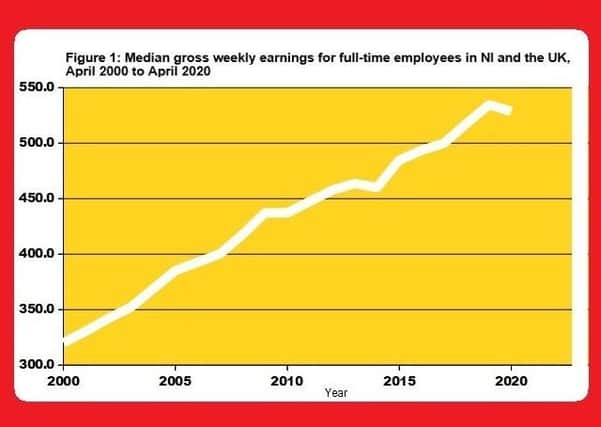Coronavirus: A historic hit to NI weekly wages – but true extent of the turmoil is only hinted at


That is the picture painted by freshly-released statistics on the state of the Province’s economy – though they merely hint at the true extent of the hardships experienced by hundreds of thousands of households, because they only take account of the first month or so of lockdown.
The figures come from a vast UK-wide research project called the Annual Survey of Hours and Earnings.
Advertisement
Hide AdAdvertisement
Hide AdIt basically takes a snapshot of workers’ paypackets for the week of April 22, and compares the earnings to April 2019, April 2018, and so on.
The survey results released yesterday by NISRA (the NI Statistics and Research Agency) contains data going back to the year 2000.
SHARP REVERSAL OF DIRECTION:
The graph above shows the median gross earnings of NI workers (which is NISRA’s preferred method of measuring wages).
Generally speaking, weekly wages in NI have risen year on year by about £10.
Advertisement
Hide AdAdvertisement
Hide AdHowever there have been two drops on record – one in 2007 when weekly wages fell by £2.20, and in 2014 when they dropped by £3.60.
But the latest data shows that as of April 22 this year weekly earnings stood at £528.60 – a drop of £5.90 on the same time in 2019.
In its report, NISRA notes that this is the “largest annual decrease in earnings in 20 years” and that it has been “impacted by furlough pay”.
The furlough scheme was announced by chancellor Rishi Sunak on March 20, and provided many staff who were unable to work with 80% of their pay.
Advertisement
Hide AdAdvertisement
Hide AdIt is just one aspect of Boris Johnson’s massive programme of public spending, which has seen the UK state borrow £173bn in the first five months of the pandemic alone – three times higher than for the entirety of 2019/20 – in order to cushion the impact on citizens.
Delving deeper into the latest batch of figures reveals some more arresting facts.
For example, it shows that the dip in wages workers felt in April was far worse for private employees: their pay packets fell by 3.2% compared to just 0.9% for public employees.
GENDER AND EARNINGS:
In terms of what is often called the “gender pay gap”, the report found that 2020 “was the 11th year where full-time females in Northern Ireland earned at least as much as full-time males on average”.
Advertisement
Hide AdAdvertisement
Hide AdPoring further over the figures, things get more complicated – and more intriguing.
Females working full-time earned 46p more per hour than full-time males (£13.28 compared to £12.82).
But whilst women earned more per hour, the annual income of males was £29,862 compared with £26,149 for females.
NISRA goes on to say that this “can be attributed to males working more hours on average and receiving higher bonuses”.
Advertisement
Hide AdAdvertisement
Hide AdIt found that on average full-time male employees work for around two-and-a-half hours longer per week than females ones do.
READ MORE FROM THE NEWS LETTER:
CLICK HERE: Academic: It’s hard to find words for how badly NI’s economy has been damaged by Covid measures
Advertisement
Hide AdAdvertisement
Hide AdA message from the Editor:
Thank you for reading this story on our website. While I have your attention, I also have an important request to make of you.
With the coronavirus lockdown having a major impact on many of our advertisers — and consequently the revenue we receive — we are more reliant than ever on you taking out a digital subscription.
Subscribe to newsletter.co.uk and enjoy unlimited access to the best Northern Ireland and UK news and information online and on our app. With a digital subscription, you can read more than 5 articles, see fewer ads, enjoy faster load times, and get access to exclusive newsletters and content. Visit https://www.newsletter.co.uk/subscriptions now to sign up.
Advertisement
Hide AdAdvertisement
Hide AdOur journalism costs money and we rely on advertising, print and digital revenues to help to support them. By supporting us, we are able to support you in providing trusted, fact-checked content for this website.
Alistair Bushe
Editor